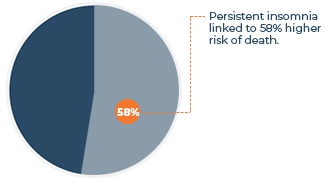It’s around 2 or 3 in the morning, isn’t it? You’re still up tossing and turning, so the first thing you do is pull out your phone, and Google “can’t sleep”. You click on a page about insomnia and find symptoms for sleep disorders:
- waking up in the middle of the night,
- sleep less than planned,
- depression,
- decreased performance,
- forgetfulness,
- and the list goes on.
Maybe this is you, maybe it’s not. But either way, here is some quick advice. Turn off your phone, get a cold drink of water, maybe take a quick stroll around the block, and go back to bed.
The blue light from your device is only keeping you up. You can finish this article tomorrow, and please do! It might have some useful data for you. But get some rest, you deserve it!
Now, if you’re still reading, hopefully, you picked this article up during the day, or you ignored me. Which is fine, you don’t know me. Either way, here are 10 facts that you may not have known about sleep disorders among our population (adults & children).
There are two types of insomnia.
Acute and chronic insomnia are the two most common types of condition that people are diagnosed with.
“Acute insomnia symptoms is common and often is brought on by situations such as stress at work in adults, family pressures, or a traumatic event. Acute insomnia lasts for days or weeks (multiple times per week). Chronic insomnia lasts for a month or longer. Most cases of chronic insomnia are secondary, which means they are the symptom or side effect of some other problem.” — National Heart Lung and Blood Institute [1]
The statistics might surprise you.
Insomnia is the most common sleeping disorder in our population. This is how many people suffer from the disorder.
According to the data, “About 30% of all adults complain of occasional insomnia and 10% of chronic insomnia, of whom 40% may have a psychiatric illness.” — Dr. Sahoo Saddichha [2]
“95% of Americans say they have insomnia at some point in their life.” — Jasvinder Chawla, MD, MBA [3]
It is twice as common in women.
Women are twice as likely to suffer when compared to men. Experts say that a variety of hormones likely play a role in poor sleep quality. Here are some other statistics relating to women’s health and sleeplessness that are noteworthy.
“The rate of insomnia is approximately 12.6% at the beginning of pregnancy, increasing as the pregnancy progresses up to 73.5% in some women.” — Obstetric Medicine [4]
“Insomnia occurs in 40–50% of women population during the menopausal transition.” — Dr. Pronob K. Dalal [5]
No one is too young to be affected.
Children and teens potentially need more rest than adults. This disorder can be troubling for them as well as their parents.
“Approximately 25% of children experience difficulties with some aspect of sleep.” — Jennifer Vrien, Ph.D. and Penny Corkum Ph.D [6]
“Insomnia symptoms during adolescence were a significant risk factors for depression diagnosis in young adulthood…” — Brandy M. Roane, MS and Daniel J. Taylor, PhD [7]
“Children sleep more poorly if their mothers suffer from insomnia symptoms – potentially affecting their mental wellbeing and development.” — Dr. Sakari Lemola [8]
05
Substance abuse and the ability to snooze are strongly linked.
There is a strong link between sleeplessness and certain substances like caffeine, alcohol, and even nicotine. These have causation that can run both ways. Example, this disorder can cause addiction versus the addiction causing restless nights.
Binge drinkers have 35% higher chances of insomnia than non-binge drinkers. — John Hopkins Bloomberg School of Public Health [9]
“A moderate dose of caffeine at bedtime, 3 hours prior to bedtime, or 6 hours prior to bedtime each have significant effects on sleep disturbance…” — Medical Professionals from Sleep Disorders & Research Center, Henry Ford Hospital [10]
“Compared with nonsmokers, heavy/continuous smokers had a significantly higher likelihood of insomnia.” — Department of Psychiatry, New York University School of Medicine [11]
It gets worse as you age.
As adults continue to get older, they often struggle to get the shut-eye they need.
“More than half of men and women over age 65 complain of at least one sleep problem. Many older people experience insomnia and other sleep difficulties on a regular basis.” — Cleveland Clinic [12]
Insomnia puts you at risk for mental disorders and vice versa.
The findings show that sleep deprivation in some form is present among most psychiatric disorders. The question remains for many suffering with these conditions, which came first, sleeplessness or the psychiatric disorder?
“65% to 90% of adult patients with major depression, and about 90% of children with this disorder, experience some kind of sleep problem.” — Harvard Health Publishing [13]
“People with insomnia were 20 times more likely to develop a panic disorder (a type of anxiety disorder).” — Harvard Medical [13]
Sleeplessness among workers cost the economy billions every year.
Sleep deprivation takes a heavy toll on work, and the economy. Research shows that getting less than 8 hours of rest per night takes a large chunk of money from workers and employers alike.
“Insomnia is costing the average U.S. worker 11.3 days, or $2,280 in lost productivity every year. “ — American Academy of Sleep Medicine [14]
As a nation, the total (insomnia) cost is 252.7 days and $63.2 billion.” — American Academy of Sleep Medicine [14]
Blue collar laborers are 2x more likely to face insomnia. These findings become even more severe for people who work the night shift. [15], [16]
Not getting enough rest can kill you.
Both sad and scary, but severe conditions can lead people to death, so if this sounds like you: listen up!
“In 2010, hypnotics (sleep medication) may have been associated with 320,000 to 507,000 excess deaths in the USA alone.” — Daniel F Kripke, M.D.; Robert D Langer, M.D; Lawrence E Kline, M.D. [17]
In the ’80s, a 53-year-old man who had progressive insomnia was put into a coma after 9 months of symptoms. He died shortly after. — The New England Journal of Medicine [18]
“Persistent insomnia linked to 58% higher risk of death.” — Catharine Paddock Ph.D. [19]

You can blame your parents for your bedtime woes.
You can’t blame your parents for everything not going well in your life, but this one might be partly their fault. The data shows people’s ancestor may have passed their restless nights onto them. Here’s how.
Two separate studies conclude that over one-third of insomnia population cases have a family history of sleep disturbances. — Medical Experts from Université Laval in Québec, Canada [20]
Scientist have found 7 genes associated with insomnia. — Researchers from Vrije Universiteit (VU) in Amsterdam in the Netherlands [21]
Get More Info: Insomnia May Be in Your Genes
Conclusion
Oh sleep, Oh gentle sleep,
Nature’s soft nurse How have I frighted thee?
That though no more will weigh mine eyelids down
And sleep my senses in forgetfulness?
Henry IV, William Shakespeare
Acute and chronic cases of sleeplessness can be serious factors for so many people. It can take a heavy toll, leaving a serious impact on performance and your life in general. If you think your problem may be chronic, consult your doctor to begin your path to recovery. Hopefully, you can find the rest you need and deserve.
Have insomnia and want to improve your sleep experience? Consider exploring our top picks for the best mattresses for insomnia.

Mark Mattei
Content Writer
About Author
Mark likes to study sleep health, write content, and produce videos on his findings. When he’s not, he’s likely writing the great American screenplay, growing out his beard, or spending time with his family.
Mark is an exclusive side sleeper with broad shoulders who looks for good pressure relief for his hips and shoulders.
Combination Sleeper
[1] Insomnia, National Heart, Lung and Blood Institute
[2] Diagnosis and Treatment of Chronic Insomnia, National Center for Biotechnology Information
[3] Insomnia, Medscape
[4] Insomnia and sleep deficiency in pregnancy, Obstetric Medicine
[5] Postmenopausal Syndrome, National Center for Biotechnology Information
[6] Clinical Management of Behavioral Insomnia of Childhood, National Center for Biotechnology Information
[7] Adolescent Insomnia as a Risk Factor for Early Adult Depression and Substance Abuse, National Center for Biotechnology Information
[8] Children’s Sleep Quality Linked to Mothers’ Insomnia, Warwick
[9] Binge Drinking and Insomnia in Middle-aged and Older Adults: The Health and Retirement Study, National Center for Biotechnology Information
[10] Caffeine Effects on Sleep Taken 0, 3, or 6 Hours before Going to Bed, National Center for Biotechnology Information
[11] Insomnia in Adults: The Impact of Earlier Cigarette Smoking from Adolescence to Adulthood, National Center for Biotechnology Information
[12] Sleep and Aging, Cleveland Clinic
[13] Sleep and Mental Health, Harvard Health Publishing – Harvard Medical School
[14] Insomnia Costing U.S. Workforce $63.2 Billion a Year in Lost Productivity, Study Shows, American Academy of Sleep Medicine
[15] Social Class and Gender Patterning of Insomnia Symptoms and Psychiatric Distress: A 20-year Prospective Cohort Study, National Center for Biotechnology Information
[16] Sleep Loss and Fatigue in Shift Work and Shift Work Disorder, National Center for Biotechnology Information
[17] Hypnotics’ Association with Mortality or Cancer: A Matched Cohort Study, BMJ Journals
[18] Fatal Familial Insomnia and Dysautonomia with Selective Degeneration of Thalamic Nuclei, The New England Journal of Medicine
[19] Persistent Insomnia Linked to Higher Risk of Death, Study Finds, Medical News Today
[20] Family History of Insomnia in a Population-Based Sample, National Center for Biotechnology Information
[21] Genome-wide association Analysis of Insomnia Complaints Identifies Risk Genes and Genetic Overlap with Psychiatric and Metabolic Traits, Nature Genetics
